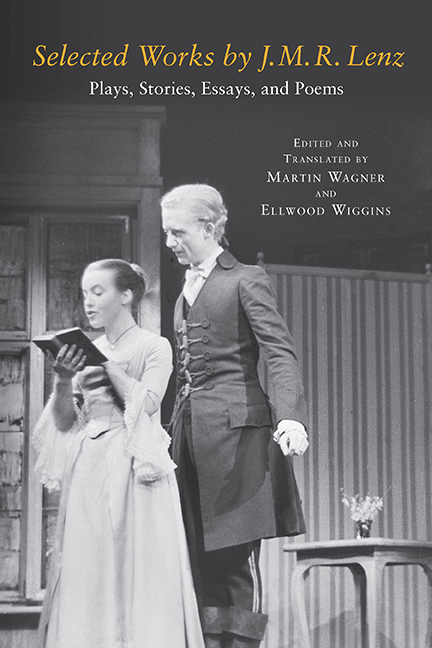Book contents
- Frontmatter
- Contents
- A Note on the Translation
- Introduction
- Part One Plays
- Part Two Stories
- Part Three Essays
- Remarks on the Theater
- On Götz von Berlichingen
- Review of The New Menoza: Written by the Author Himself
- On Scene Changes in Shakespeare
- On the Marriages of Soldiers
- Part Four Poems
- Chronology
- A Note on the Currencies in Lenz's Works
- Selected Bibliography
- Index
On the Marriages of Soldiers
from Part Three - Essays
Published online by Cambridge University Press: 27 March 2020
- Frontmatter
- Contents
- A Note on the Translation
- Introduction
- Part One Plays
- Part Two Stories
- Part Three Essays
- Remarks on the Theater
- On Götz von Berlichingen
- Review of The New Menoza: Written by the Author Himself
- On Scene Changes in Shakespeare
- On the Marriages of Soldiers
- Part Four Poems
- Chronology
- A Note on the Currencies in Lenz's Works
- Selected Bibliography
- Index
Summary
l'opinion du moment fait tout a la guerre.
—Guibert (Essay de la tactique)I write this for kings, not knowing whether even one of them will ever read me. It is unfortunate for them if they do not, because I write for their sake, not for mine.
If the passions of the powerful and the laziness of the weak had not solved this riddle for me, I would be more than surprised that, in times as enlightened as ours, no one has yet fully thought through and discussed a matter of such importance. As it is, however, the princes lacked the time, and the subjects the inclination to think about it, and the scholars, always more prone to gather knowledge than to apply it, because the latter is more dangerous, have been too wise to sacrifice themselves for the needs of the state.
In the earliest times, citizen and soldier were inseparable—and why should they be separable? Nature has taught each animal both to sustain itself and to defend itself; she provided each animal with its weapon, among which one has to count fast legs just as much as horns and claws. Thus every human being has been created with its weapons and the combination of these unfailingly produced the most terrifying military force.
We see proof of that in the Greeks and in the most ancient Nordic nations, which, without either culture or science, still overran all of Europe. But when idleness and fear afterwards introduced feudal order among the nomadic hordes, the weaker people became willing vassals of the more powerful. Trade and the arts, which do not suffer any slavery, eventually woke them from their slumber and forced them to seek protection among the kings from the increasing power of the great. These had to counter armed violence with more than good sense and superior insight; they had to counter it with armed violence. Charles V, the wisest among all kings of France, was the first who, during the successful expulsion of the English from his lands, experienced the advantage of hired troops. As all inventions improve in the hands of the successors, Charles VII, forced by even less fortunate circumstances, perfected the institution of a regulated force and thus put a weapon into the hands of his successors.
- Type
- Chapter
- Information
- Selected Works by J. M. R. LenzPlays, Stories, Essays, and Poems, pp. 301 - 336Publisher: Boydell & BrewerPrint publication year: 2019



